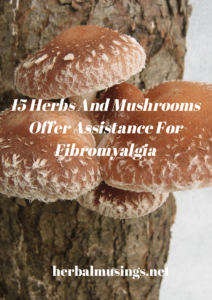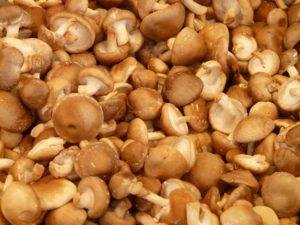Fibromyalgia is a common syndrome of chronic widespread soft-tissue pain accompanied by weakness, severe fatigue and sleep disturbances. It is non-inflammatory in nature and symptoms can range from mild to severe. For some, just going to the street to get the mail from their mailbox or walking from one room to another can be difficult. Other people live normal lives with occasional flareups of fibromyalgia symptoms.
Some Symptoms of Fibromyalgia
- Dysmenorrhea (painful menstruation)
- Migraines and headaches
- Severe fatigue
- Fibromyalgia fog or brain fog (confusion, memory lapse, word mix-ups, and concentration difficulties)
- Irritable bladder
- Twitchy muscles at night (nocturnal myoclonus)
Sedative Herbs for Fibromyalgia
This syndrome is a chronic sleep disorder. Nervine herbs relax the nervous system, promoting sleep and achieving deep and restful sleep throughout the night. Not all sedative herbs work the same way for everyone. There are some relaxing herbs that are more potent and have a sedative effect.
Chamomile (Matricaria chamomilla) promotes better sleep, reduces anxiety and even boosts the immune system. The dried flowers of chamomile contain terpenoids and flavonoids which contribute to its curative and preventive medicinal properties. It is very mild and is safe even for children. Drink chamomile tea, either in a tea ball with loose herb or in teabags. Pour boiling water in a mug and add the herb, covering the mug with a plate to trap the oils in the tea. Cover the mug for 5 minutes before drinking.
Valerian (Valeriana officinalis) is most well-known for its sedating and relaxing properties. It is used for people who have anxiety, nervousness, restlessness, and insomnia. Valerian is very sedating promoting falling asleep fast and improving the quality of sleep. Use as a fresh root tincture starting with just a few drops at a time.
Adaptogenic herbs for Fibromyalgia
Adaptogens support the body’s resilience to stress. One way to think about adaptogens is deep nourishment and support for the nervous system.
Rhodiola (Rhodiola rosea) root provides a significant boost to cognitive function and helps to regain mental clarity and focus. Rhodiola helps relieve stress, anxiety, fatigue, alleviate depression symptoms, boost memory and stimulate the activity of the neurotransmitters serotonin, norepinephrine, and dopamine.
This herb helps your body adapt to stress and improves cognitive abilities. Rhodiola provides a natural energy boost, it enhances energy and boosts productivity by increasing the capacity of red blood cells to carry oxygen. Even though many conventional antidepressants have side effects, rhodiola has no serious side effects. For this reason, it is very useful as a treatment for depression that is common in fibromyalgia sufferers. Rhodiola root is taken as a tincture or a decoction daily.
Holy Basil (Ocimum sanctum) also known as Tulsi helps the body adapt to stress. It promotes energy and endurance. This herb is a nervine and an adaptogen increasing the body’s ability to efficiently use oxygen. Tulsi helps calm your mind and recover from our hustle and bustle days.
Holy basil has positive effects for people diagnosed with chronic fatigue syndrome. Tulsi is high in eugenol, a constituent that is helpful to decrease pain making it useful for musculoskeletal pain.
Take this herb as tea or tincture. Holy basil tincture to start with 40 – 60 drops of a 1:2 tincture, 2 – 3 times a day. For a tea pour boiling water in a mug and add 1 tsp. of herb, covering the mug with a plate to trap the oils in the tea for 5-10 minutes before drinking.
Anodyne Herbs for Fibromyalgia
Cottonwood (Populus spp.) uses are as a salve or infused oil for topical use or a tincture for internal use. It helps relieve sore muscles, strained muscles, joint pain, and bruises. Cottonwood modulates inflammation and directly relieves pain.
St. John’s Wort (Hypericum perforatum) has the ability to restore nervous system function to a healthy state. A mild sedative, analgesic and anti-inflammatory makes it a fantastic fighter of nerve pain, muscle pain, inflammation and helps bring relaxing sleep. Use St. John’s wort as a tincture or as a salve.
Carminative herbs for Fibromyalgia
Carminative herbs promote digestion and can be an important part of healing a leaky gut, which is often a factor.
Fennel (Foeniculum vulgare) can provide relief for pain and inflammation of bones, muscles and joints. It is rich in antioxidants, including the flavonoids quercetin and rutin. These help to reduce inflammation in the body and protect cells from oxidative stress damage. The best way to take fennel is as a tea.
Cardamom (Elettaria cardamommum) assists muscle and joint pain and improves blood circulation. Use this herb in food dishes, teas, tinctures and infusions.
Ginger (Zingiber officinale) has pain-relieving and anti-inflammatory properties. Ginger root is warming and improves poor circulation. Ginger taken as a tea, add 1 tsp of freshly grated ginger in one cup of boiling water. Let steep, covered for 10 minutes. Apply a ginger compress to pain points for pain relief.
Immunomodulating herbs for Fibromyalgia
Immunomodulating herbs build and strengthen the immune system. These herbs are slower acting with a more prolonged effect in the body. They help people with autoimmunity, frequent colds, flu and seasonal allergies.
Astragalus (Astragalus membranaceus) root builds and restores general health to the body. People who are completely run down benefit positively with this herb. Astragalus has anti-inflammatory and antibacterial properties. Astragalus is tonifying to the entire nervous system. It is taken as a tincture 40-80 drops 3x a day.
Cordyceps (Cordyceps sinensis) has potent anti-inflammatory properties. Cordyceps treat fatigue, exhaustion and provides energy and increased stamina. It helps relieve anxiety, treat insomnia, (a biggie for fibromyalgia patients), increase energy and enhances the immune system. The powder form is used in soups, teas, tonics and stews.










